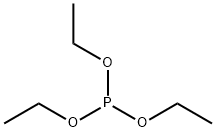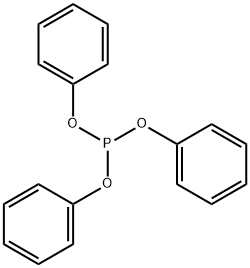A7684312
Trimethyl phosphite , CP,95.0% , 121-45-9
Synonym(s):
Methyl phosphite;P(OMe)3;TMP;Trimethoxyphosphine;Trimethyl phosphite
CAS NO.:121-45-9
Empirical Formula: C3H9O3P
Molecular Weight: 124.08
MDL number: MFCD00008350
EINECS: 204-471-5
Update time: 2022-07-08
PRODUCT Properties
| Melting point: | −78 °C(lit.) |
| Boiling point: | 111-112 °C(lit.) |
| Density | 1.052 g/mL at 25 °C(lit.) |
| vapor density | 4.3 (vs air) |
| vapor pressure | 17 mm Hg ( 20 °C) |
| refractive index | n |
| Flash point: | 82 °F |
| storage temp. | 2-8°C |
| solubility | Chloroform, DMSO (Sparingly) |
| form | Liquid |
| Specific Gravity | 1.052 |
| color | Colorless |
| explosive limit | 5.2-61.2%(V) |
| Water Solubility | Hydrolyzes with water. |
| Sensitive | Air & Moisture Sensitive |
| Hydrolytic Sensitivity | 4: no reaction with water under neutral conditions |
| BRN | 956570 |
| Exposure limits | TLV-TWA 10 mg/m3 (2 ppm) (ACGIH). |
| Stability: | Moisture Sensitive |
| CAS DataBase Reference | 121-45-9(CAS DataBase Reference) |
| NIST Chemistry Reference | Phosphorous acid, trimethyl ester(121-45-9) |
| EPA Substance Registry System | Trimethyl phosphite (121-45-9) |
Description and Uses
Trimethyl phosphite has been used primarily as an intermediate in the manufacture of pesticides and the synthesis of organophosphate insecticides. It is also used as a fire retardants in the production of textiles, as an intermediate in the production of flame-retardant polymers for polyurethane foams, and as a catalyst.
Safety
| Symbol(GHS) |    GHS02,GHS07,GHS08 |
| Signal word | Warning |
| Hazard statements | H226-H302-H315-H317-H319-H335-H341-H351 |
| Precautionary statements | P210-P280-P301+P312-P303+P361+P353-P305+P351+P338-P308+P313 |
| Hazard Codes | Xn,T,F,Xi |
| Risk Statements | 10-22-36/37/38-41-37/38-65-48/23/24/25-11-46-45-67-66-36 |
| Safety Statements | 26-39-62-45-16-53 |
| OEB | B |
| OEL | TWA: 2 ppm (10 mg/m3) |
| RIDADR | UN 2329 3/PG 3 |
| WGK Germany | 1 |
| RTECS | TH1400000 |
| F | 10-13-21 |
| Autoignition Temperature | 250 °C |
| TSCA | Yes |
| HS Code | 2920 23 00 |
| HazardClass | 3 |
| PackingGroup | III |
| Hazardous Substances Data | 121-45-9(Hazardous Substances Data) |
| Toxicity | LD50 orally in Rabbit: 1600 mg/kg LD50 dermal Rabbit 2600 mg/kg |





